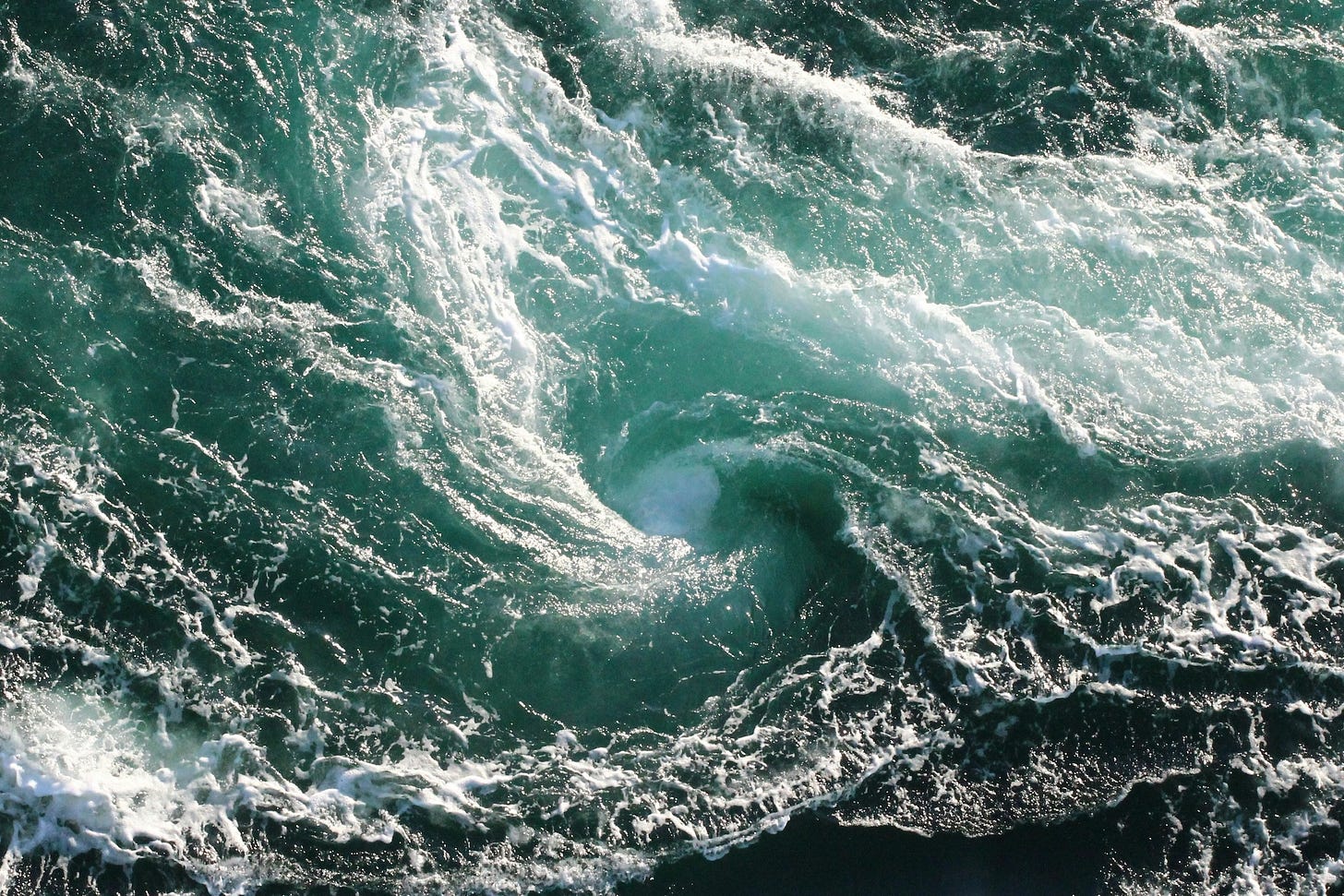The Ocean of Shame
through vituperation, ignominy, and mortification to the shore of good shame
For there is a shame that brings sin; and there is a shame that brings glory and grace.
〰 Ecclesiasticus 〰
Freak Waves of Shaming
…it breeds only cunning hypocrites — people sermonized into shame…
〰 Alan Watts 〰
What is shame?
Is it a form of emotional distress due to humiliation?
A euphemism for a private bodypart?
Loss of social status and reputation?
An accusation or exposure of a mortifying inadequacy?
A failure or inability to live up to an ideal of perfection?
A disgrace or ignominy?
Embarrassment or guilty conscience?
Regret, remorse, repentance, or being truly and deeply sorry?
Or does it have something to do with genetic flaws humans are born with?
Shame [allegedly a word with unknown etymology] is defined as “painful feeling of guilt or disgrace; confusion caused by shame; state of being in disgrace; dishonor, insult, loss of esteem or reputation; shameful circumstance, what brings disgrace; modesty.”
Brené Brown ~ American social reseacher and author who has spent decades studying, researching and writing about this topic ~ defines shame as “the intensely painful feeling or experience of believing that we are flawed and therefore unworthy of love and belonging.”
Brown’s definition makes a lot of sense.
Until we think about the fact that in the age of selfies, social media and AI, anyone can look their best, attract an impressive following, find their tribe, become an expert at something, and find fame and glory ~ in their own niche ~ within the comfortable zone of their supporters.
This unprecedented opportunity should safeguard us against the belief “that we are flawed and therefore unworthy of love and belonging.” It should make us all immune against this intensely painful emotional experience.
Why doesn’t it work like that?
We could blame cyber trolls hiding behind virtual clouds, ready to bad-name and defame unsuspecting targets.
It’s not their fault. The roots of shame run a lot deeper and are a hell of a lot older.
Here is an incomplete list of forms of shaming, familiar and common:
Age shaming
Body shaming
Child shaming
Cultural shaming
Disciplinary shaming
Eco-footprint shaming
Emotion shaming
Fact shaming
Failure shaming
Fat shaming
Food shaming
Gender shaming
Grief shaming
Health shaming
Identity shaming
IQ shaming
Moral shaming
Political shaming
Poverty shaming
Privilege shaming
Public shaming
Race shaming
Religious shaming
Sexual shaming
Skinny shaming
Social shaming
Toxic shaming
Truth shaming
Victim shaming
Woke shaming
According to the Genesis account of Thora and Bible , shame was the very first emotion experienced by our human ancestors, a keystone upholding the structure of these religions.
We all know the story. Adam and Eve were not ashamed of their nakedness until they took the first bite of the Forbidden Fruit from the Tree of Knowledge.
Taking that prohibited bite allegedly triggered a sense of shame in the first couple, which lead to an urge to cover their private parts with fig leaves. Due to this old story, shame and sexuality are inseparably linked in many cultures, stuck together with the religious superglue of sin.
The Mælstrom of Vituperating
Through our sunless lanes creeps
Poverty with her hungry eyes, and
Sin with his sodden face follows close behind her.
Misery wakes us in the morning and
Shame sits with us at night.
〰 Oscar Wilde 〰
Brené Brown’s definition is rooted in her personal childhood experience embedded in this cultural vituperative soil. One particular memory stands out, as described in her book Braving the Wilderness.
At the age of 12, Brené took part in a dance competition and wasn’t offered the place she had hoped to win. “I walked back to our station wagon and got in the backseat, and my dad drove away.” she recalls. “My parents didn’t say one word. Not a single word. The silence cut into me like a knife to the heart. They were ashamed of me and for me.”
Vituperation [from Latin vitium = fault, defect + parare = prepare, provide, procure] is a relatively rare English word used for severe blaming, bitter and abusive language, verbal condemnation.
In our contemporary online world this is known as hate speech. Although created and experienced largely in or via virtual reality, these vicious words have devastating, sometimes fatal consequences, offline, in real life.
While vituperative words are relatively easy to spot on social media walls, Brown’s experience points to the disturbing fact that, under certain circumstances, a wall of silence may spell shame and blame too, which is just as vicious in the experience of the recipient.
Shaming segregates humans from each other with the blade of assumed sinfulness. Shame cuts us off from ourselves, enforced by presumed inadequacy, inflicting a wound of separation, which is incredibly resistant to healing.
“There is no way of getting rid of the feeling of separateness by a so-called ‘act of will,’ by trying to forget yourself, or by getting absorbed in some other interest,” Alan Watts writes in The Book. “This is why moralistic preaching is such a failure: it breeds only cunning hypocrites — people sermonized into shame, guilt, or fear, who thereupon force themselves to behave as if they actually loved others, so that their ‘virtues’ are often more destructive, and arouse more resentment, than their ‘vices’.”
Cross Currents of Ignominy
The basis of shame is not some personal mistake of ours,
but the ignominy, the humiliation
we feel that we must be what we are
without any choice in the matter,
and that this humiliation is seen by everyone.
〰 Milan Kundera 〰
Shame and disgrace go hand in hand in many languages. There is an English word too that captures both, the internal experience of shame and the external loss of grace (= favor, esteem, regard; pleasing quality, good will, gratitude) specifically the social status associated with it. This word is ignominy.
Ignominious [from Latin in = not + gnoscere = to know] is literally a quality of having lost one’s (good) name.
Ignominy is associated with public shame, disgrace, and loss of reputation. In Ancient Rome and Greece it was connected with crucifixion. The capital punishment of being nailed to a cross was considered the most shameful, reserved for the lowest, the most evil, wicked, most disgraced members of society.
Ignominious are people, or actions, that are so shameful, they don’t deserve to be named and are best forgotten.
An intriguing feature of this word is that the same root has sprouted a quartet of adjectives: ignoble (of low birth), ignorant (lacking knowledge), ignominious (infamous, shameful, disgraceful), incognito (unknown, with concealed identity).
This linguistic / etymological link suggests that the experience of shame may be connected with, or dependent on not being known, or not being seen.
Brené Brown confirms this suspicion when she writes, “If we can share our story with someone who responds with empathy and understanding, shame can't survive.”
Flash Floods of Mortification
Oh shame, where is thy blush?
〰 William Shakespeare 〰
One of my earliest life memories is tainted by shame. I was three years old. In my Arabic kindergarten, run by Lutheran nuns, we had to pray before mealtimes.
Praying included closing your eyes and folding your hands. It didn’t involve eating a banana, or any other food sitting on the table, ready to be blessed. I must have known that ~ in theory.
Despite this awareness, three year old me decided, prayer time was an opportunity to take a bite from my banana. Maybe I was hungry. Everyone had their eyes closed. I was confident God wouldn’t mind.
Sister Najla caught me red-handed, sent me off the table without banana, and told me to stand in the corner. I don’t recall how long this punishment lasted, but I know it left some deep imprint in my memory.
Sister Najla’s command left me deeply shaken. As if she had deceived me on purpose. Had she kept her eyes closed, following her own rules, she wouldn’t have noticed ~ so my infantile reasoning. I felt betrayed, confused, scared, swamped by an overwhelming wave of painful feelings.
Was that shame?
Shame [from Old English scamu] is defined as a painful feeling of guilt or disgrace; confusion caused by shame; state of being in disgrace, dishonoured, insulted, humiliated, mortified,…”
Etymologically, shame is related to English sham, scam, scandal and German Scham (= shame, mortification, ignominy, external genitals), Schande (= disgrace), Schmach (= humiliation, ignominy, scandal), Schaden (= damage, defect, detriment, harm, injury).
When I told my mother about the incident ~ fifteen (15!) years later ~ she laughed it off. At the age of eighteen I believed I must have been deeply ashamed and too scared to tell her, for fear of further punishment.
Experientially, shame is related to punishment, reputation, social standing, and trauma.
Punishment [from Latin poena = punishment] is a penalty or sanction for an offence, breach of rules, transgression of moral code, or commitment of a crime.
In addition to inflicting pain and suffering, punishment is intended to instill shame in recipients, to discourage breaches of the law.
The English word punish is closely related to pain, penal, penalise, penalty, penitence, pine, punitive, impunity, repent, the German word Pein (= anguish, pain, torment), and the Greek word poinē (= payment).
Having fallen into this chasm, it took me a further few decades to climb out of it.
But was it truly shame for being punished?
Or shame of having done something wrong?
Another word for the act of instilling shame is mortification [from Latin mortis = death + facere = to do, make] literally making dead.
While mortification doesn’t physically kill anyone ~ at least not directly ~ it is a killing off of a person while alive.
The word mortify is related to morbid, mortality, murder, and post mortem. No wonder shame makes humans want to sink into the ground and disappear from view.
Looking back at this small event with a larger than life impact on my experience, I don’t recall ever feeling shame about the incident. Punishing a young child for something she cannot understand may instil fear, bewilderment, confusion, shyness, self-consciousness, awkwardness, insecurity, anger, resentment, a sense of betrayal, and loss of trust… not necessarily shame.
Having said that, being born and educated within a religion that declares its devotees as sinners by default, the incident was my first external experience of public shaming.
Meeting Shame at the Shore
The dark thought, the shame, the malice,
meet them at the door laughing,
and invite them in.
〰 Rumi 〰
The Ancient Greeks distinguished shame in the bad sense of ‘disgrace, dishonour’ from shame in the good sense of ‘decency, pudency’.
A similar distinction can be found in many languages. In English, the closest words for ‘shame in the good sense’ may be abashment or embarrassment.
Abash [from Old French abaissier = diminish, bow, lower oneself] adopted (14 c) in English in the sense of losing one’s composure, being thrown into confusion by any strong emotion.
In this constellation and context, the word bash is related to base. (It is unrelated to the homonym bash in the sense of a violent blow or a party, social event.)
Embarrass [from French embarrasser = to block, bar] in the sense of hamper, hinder; throw into doubt, first recorded in English 1680s, took on the meaning of awkward in early 19th c.
Embarrassed ~ a composite of em [from French en = within] + bar [from French barre = beam, bar, barrier] a rod of iron used to close a gate ~ is an internal state of hitting a barrier.
Shame in the bad sense is used to establish a hierarchical order, a moral superiority related to status and wealth. This type of shame is entrenched in the anthropocentric mind, underpinned by religions and psychological manipulation, to maintain power and social advantages.
Shame in the good sense is a perception of being or becoming aware of hitting a boundary. Embarrassment enables us to recognise barriers of decency. Instead of iron rods, such bars are made of moral, cultural, social, emotional, personal and collective stakes to help us navigate our relationships with the outer world while finding ways of living together in the Symbiocene.
Shame is an ocean I swim across
Sometimes I call it drowning…
Other times I repeat the language from my child mouth
while beating my head against the wall…
All the time, I am forgiven…
I’m just Blue, Blue, Blue.
〰 Mary Lambert 〰
*from Mary Lambert’s poem, Shame is an Ocean I Swim Across
poem/song starting at 9:53









Veronika, what an incredible post—thank you for addressing this topic in such a detailed and thoughtful way. I also have a draft on shame, but I paused writing it because of the mixed feelings that surfaced while working on it. Your post has been very helpful for me. I’m sorry to hear about your kindergarten experience at such a young age—shaming like that tends to stick with us and resurface in unpredictable ways.
In my case, I’ve experienced shame for as long as I can remember—a persistent feeling of inadequacy. For me, shame has always been tied to not belonging, feeling like an outsider, or being different. I began to understand this more deeply when I started forming meaningful connections. As Brené Brown says, “If we can share our story with someone who responds with empathy and understanding, shame can’t survive.”
Thank you again for your dedication. Your work is not only valuable but also incredibly insightful and well-structured. I admire you, send you energy to keep writing and sharing your gift!
Very valuable writing Veronica, thank you and many thanks everybody for all the comments.
Our society, the plurality of histories and cultural legacies usually requiring heavily modified behaviours has become increasingly located in ever larger mass environments that generate criminality and exploitive perversities, including traumatised personalities taking it out on others, and all the rest. A glance back to various histories over thousands of years gives us an idea of the range. The anthropologist and scholar the late David Graeber's great volume - and those terrific footnotes - ‘Debt, The First 5000 years’, is one such useful sketch. I can only dip in from time to time.
I have recently tentatively come up with a term 'ur-humanity', when trying to follow the gifted others, past and present trying for insight, even remedy. This in my view is an historical and societal search (see Graeber on understanding the present). We are lucky in my view as individuals if we find ourselves somewhere within a protected 'human family' heritage. The way we experience and ‘see others', the creatures, the web of relations and the relationship with a self-repairing core of our being seems important. For example, looking back, even in terms of our biology people have been expected often enough to manage with prescribed behaviours that if applied to say farm or zoo animals would result in breeding failures, mental health problems and sociopathic behaviour. My guess is that collectively we still do not know what 'we' are doing? Our schooling systems still too often can breed sociopathic behaviour.
It is possible that this expanded industrial civilisation has the lifespan and resources left to work out what works for creatures and our biological selves and the repair mechanisms of the mind and consciousness we are semi-autonomous parts of. Start with dance, song, musicality and story and poetry? Assume love and grace works? It would be something to save for the future.
Shame has a part. As a child I borrowed the air-rifle and first shot hit a sparrow on a chimney pot. That was it. It was not possible after that. I have had to kill animals at times and I value the needs of aboriginal communities, but there is a need for deep knowledge and a wide boundary, a context, to our attention?
Well on in adulthood I was shamed by a youngish child when I was making disparaging 'humorous' comment about an older relative. That was it.
We all blush, even blench, at recalled regrets, even relive trauma suffered from others or events, but it is possible to pilgrimage the 'Vale of Forgetting' leaving baggage not needed on the pilgrimage.
Nods head! Amen. 😊👍